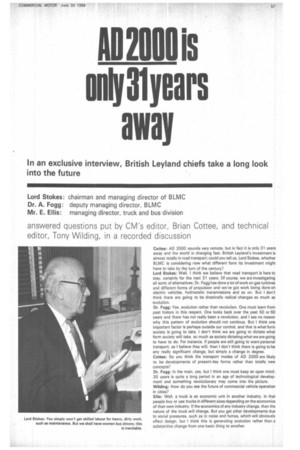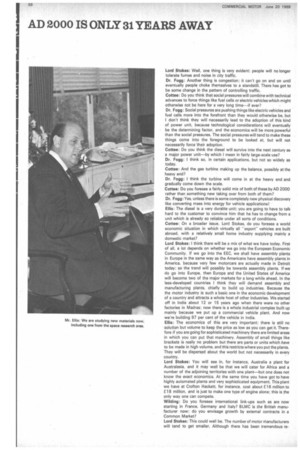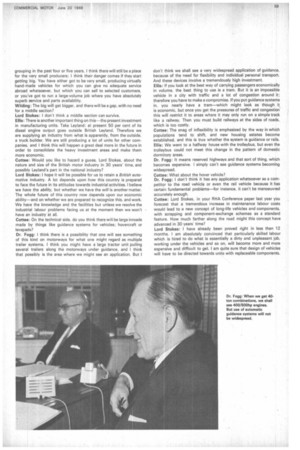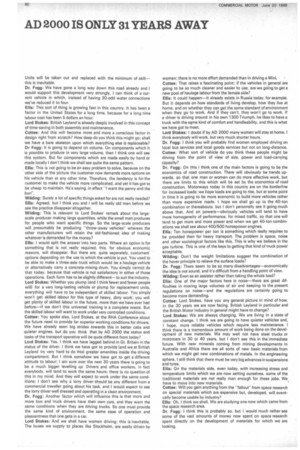1101000 is
Page 59

Page 60

Page 61

Page 62

If you've noticed an error in this article please click here to report it so we can fix it.
only31years away
In an exclusive interview, British Leyland chiefs take a long look into the future
Lord Stokes: chairman and managing director of BLMC Dr. A. Fogg: deputy managing director, BLMC Mr. E. Ellis: managing director, truck and bus division
answered questions put by CM's editor, Brian Cottee, and technical editor, Tony Wilding, in a recorded discussion
Cottee: AD 2000 sounds very remote, but in fact it is only 31 years away and the world is changing fast British Leyland's investment is almost totally in road transport: could you tell us, Lord Stokes, whether BLMC is considering now what different form its investment might have to take by the turn of the century?
Lord Stokes: Well, I think we believe that road transport is here to stay, certainly for the next 31 years. Of course, we are investigating all sorts of alternatives; Dr. Fogg has done a lot of work on gas turbines and different forms of propulsion and we've got work being done on electric vehicles, hydrostatic transmissions and so on. But I don't think there are going to be drastically radical changes so much as evolution, Dr. Fogg: Yes, evolution rather than revolution. One must learn from past history in this respect. One looks back over the past 50 or 60 years and there has not really been a revolution, and I see no reason why this pattern of evolution should not continue. But I think one important factor is perhaps outside our control, and that is what form society is going to take. I don't think we are going to dictate what form society will take, so much as society dictating what we are going to have to do. For instance, if people are still going to want personal transport, as I believe they will, then I don't think there is going to be any really significant change, but simply a change in degree.
Cottee: So you think the transport modes of AD 2000 are likely to be developments of present-day forms rather than totally new concepts?
Dr. Fogg: In the main, yes. but I think one must keep an open mind; 30 years is quite a long period in an age of technological development and something revolutionary may come into the picture.
Wilding: How do you see the future of commercial vehicle operation in cities?
Ellis: Well, a truck is an economic unit in another industry, in that people buy or use trucks in different sizes depending on the economics of their own industry. If the economics of any industry change, then the nature of the truck will change. But you get other developments due to social pressures, such as in noise and fumes, which will obviously affect design, but I think this is generating evolution rather than a substantive change from one basic thing to another. Lord Stokes: Well, one thing is very evident: people will no longer tolerate fumes and noise in city traffic.
Dr. Fogg: Another thing is congestion; it can't go on and on until eventually people choke themselves to a standstill. There has got to be some change in the pattern of controlling traffic.
Cottee: Do you think that social pressures will combine with technical advances to force things like fuel cells or electric vehicles which might otherwise not be here for a very long time—if ever?
Dr. Fogg: Social pressures are pushing things like electric vehicles and fuel cells more into the forefront than they would otherwise be, but I don't think they will necessarily lead to the adoption of this kind of power unit, because technological considerations will eventually be the determining factor, and the economics will be more powerful than the social pressures. The social pressures will tend to make these things come into the foreground to be looked at. but will not necessarily force "their adoption.
Cottee: Do you think the diesel will survive into the next century as a major power unit—by which I mean in fairly large-scale use?
Dr. Fogg: I think so, in certain applications, but not so widely as today.
Cottee: And the gas turbine making up the balance, possibly at the heavy end?
Dr. Fogg: I think the turbine will come in at the heavy end and gradually come down the scale.
Cottee: Do you foresee a fairly solid mix of both of these by AD 2000 rather than something new taking over from both of them?
Dr. Fogg: Yes, unless there is some completely new physical discovery like converting mass into energy for vehicle applications!
Ellis: The diesel is a very durable unit; you are going to have to talk hard to the customer to convince him that he has to change from a unit which is already so reliable under all sorts of conditions. Cottee: On a broader issue, Lord Stokes, do you foresee a world economic situation in which virtually all -export" vehicles are built abroad, with a relatively small home industry supplying mainly a domestic market?
Lord Stokes: I think there will be a mix of what we have today. First of all, a lot depends on whether we go into the European Economic Community. If we go into the EEC, we shall have assembly plants in Europe in the same way as the Americans have assembly plants in America, because very few motorcars are actually made in Detroit today; so the trend will possibly be towards assembly plants. If we do go into Europe, then Europe and the United States of America will become two of the major markets for a long while ahead. In the less-developed countries I think they will demand assembly and manufacturing plants, chiefly to build up industries. Because the the motor industry is such a basic one in the economic development of a country and attracts a whole host of other industries. We started off in India about 12 or 15 years ago when there were no other factories in Madras; now there is a whole industrial complex built up mainly because we put up a commercial vehicle plant. And now we're building 97 per cent of the vehicle in India.
Ellis: The economics of this are very important; there is still no solution but volume to keep the price as low as you can get it. Therefore if you are going for sophisticated machinery there are limited areas in which you can put that machinery. Assembly of small things like brackets is really no problem but there are parts or units which have to be made in high volume, and this restricts where you put the plants. They will be dispersed about the world but not necessarily in every country.
Lord Stokes: You will see in, for instance. Australia a plant for Australasia, and it may well be that we will cater for Africa and a number of the adjoining territories with one plant—but one does not know the exact economics. At the same time you have got to have highly automated plants and very sophisticated equipment. This plant we have at Crofton Hackett, for instance, cost about £16 million to E 1 8 million, and is just to make one type of engine alone: this is the only way one can compete.
Wilding: Do you foresee international link-ups such as are now starting in France. Germany and Italy? BLMC is the British manufacturer now: do you envisage growth by external contracts in a Common Market?
Lord Stokes: This could well be. The number of motor manufacturers will tend to get smaller. Although there has been tremendous re
grouping in the past four or five years. I think there will still be a place for the very small producers: I think their danger comes if they start getting big. You have either got to be very small, producing virtually hand-made vehicles for which you can give no adequate service abroad whatsoever, but which you can sell to selected customers, or you've got to run a large-volume job where you have absolutely superb service and parts availability.
Wilding: The big will get bigger, and there will be a gap, with no need for a middle section?
Lord Stokes: 1 don't think a middle section can survive.
Ellis: There is another important thing on this the present investment in manufacturing units. Take Leyland: at present 50 per cent of its diesel engine output goes outside British Leyland. Therefore we are supplying an industry from what is apparently, from the outside. a truck builder. We are still producing a lot of units for other companies, and I think this will happen a great deal more in the future in order to consolidate the heavy investment areas and make them more economic.
Cottee: Would you like to hazard a guess, Lord Stokes, about the nature and size of the British motor industry in 30 years' time, and possibly Leyland's part in the national industry?
Lord Stokes: I hope it will be possible for us to retain a British automotive industry. A lot depends upon how this country is prepared to face the future in its attitudes towards industrial activities. I believe we have the ability, but whether we have the will is another matter. The whole future of this country now depends upon our economic ability—and on whether we are prepared to recognize this, and work. We have the knowledge and the facilities but unless we resolve the industrial labour problems facing us at the moment then we won't have an industry at all.
Cottee: On the technical side, do you think there will be large inroads made by things like guidance systems for vehicles; hovercraft or levapads?
Dr. Fogg: I think there is a possibility that one will see something of this kind on motorways for what one might regard as multiple trailer systems. I think you might have a large tractor unit pulling several trailers along the motorways under guidance, and I think that possibly is the area where we might see an application. But I don't think we shall see a very widespread application of guidance, because of the need for flexibility and individual personal transport. And these devices involve a tremendously high investment.
Ellis: If you look at the best way of carrying passengers economically in volume, the best thing to use is a tram. But it is an impossible vehicle in a city with traffic and a lot of congestion around it: therefore you have to make a compromise. If you put guidance systems in, you nearly have a tram—which might look as though it is economic, but once you get the pressures of traffic and congestion' this will restrict it to areas where it may only run on a simple track like a railway. Then you must build railways at the sides of roads, which is too costly.
Cottee: The snag of inflexibility is emphasized by the way in which populations tend to shift, and new housing estates become established, and this is true whether the system is guidance or rails. Ellis: We went to a halfway house with the trolleybus, but even the trolleybus could not meet this change in the pattern of domestic dormitory areas.
Dr. Fogg: It means reserved highways and that sort of thing which becomes expensive. I simply can't see guidance systems becoming widespread.
Cottee: What about the hover vehicle?
Dr. Fogg: I don't think it has any application whatsoever as a competitor to the road vehicle or even the rail vehicle because it has certain fundamental problems—for instance, it can't be manoeuvred accurately enough.
Cottee: Lord Stokes, in your RNA Conference paper last year you forecast that a tremendous increase in maintenance labour costs would lead to a new concept of long-life vehicles and components, with scrapping and component-exchange schemes as a standard feature. How much farther along the road might this concept have advanced in 30 years' time?
Lord Stokes: I have already been proved right in less than 12 months. I am absolutely convinced that particularly skilled labour which is hired to do what is essentially a dirty and unpleasant job, working under the vehicles and so on, will become more and more expensive and difficult to get. I am quite sure that design of vehicles will have to be directed towards units with replaceable components. Units will be taken out and replaced with the minimum of skill— this is inevitable.
Dr. Fogg: We have gone a long way down this road already and I would support this development very strongly. I can think of a current vehicle in which, instead of having 30-odd water connections we've reduced it to four.
Ellis: This sort of thing is growing fast in this country. It has been a factor in the United States for a long time, because for a long time labour cost has been 5 dollars an hour.
Lord Stokes: British Leyland is already deeply involved in this concept of time-saving in both assembly and maintenance.
Cottee: And this wit become more and more a conscious factor in design right from scratch? How deep do you think this might go: shall we have a bare skeleton upon which everything else is replaceable? Dr Fogg: It is going to depend on volume. On components which it is possible to produce in very large volume, then I think one will see this system. But for components which are made easily by hand or made locally I don't think we shall see quite the same pattern.
Ellis: This is not going to be an easy problem to solve, because on the other side of the picture the customer now demands more options on his vehicle than at any other time. Therefore, the tendency is for the customer to make the vehicle more complicated, and yet it has got to be cheap to maintain. He's saying, in effect "I want the penny and the bun".
Wilding: Surely a lot of specific things asked for are not really needed? Ellis: Agreed, but I think you and I will be really old men before we see the practice disappear altogether.
Wilding: This is relevant to Lord Stokes' remark about the largescale producer making large quantities, while the small man produces for people who want specific things. So the large-scale producers will presumably be producing "throw-away vehicles" whereas the other manufacturers will retain the old-fashioned idea of making whatever is demanded for the money?
Ellis: I would split the answer into two parts. Where an option is for something that is not really required, this, for obvious economic reasons, will disappear. But there are. quite separately, customers' options depending on the use to which the vehicle is put. You used to be able to make a three-axle truck which would be a haulage vehicle or alternatively carry a concrete-mixing drum. You simply cannot do that today, because that vehicle is not satisfactory in either of those operations. Each form has to be slightly different—to suit the industry. Lord Stokes: Whether you plump (and I think fewer and fewer people wall for a very long-lasting vehicle or plump for replacement units, everything will have to be independent of skilled labour. You simply won't get skilled labour for this type of heavy, dirty work; you will get plenty of skilled labour in the future, more than we have ever had before—if we don't this universal training is a complete waste. But the skilled labour will want to work under very controlled conditions. Cottee: You spoke also, Lord Stokes, at the RHA Conference about the future need to provide far superior working conditions for drivers. We have already seen big strides towards this in better cabs and quieter engines, but do you think that by AD 2000 the status and tasks of the transport operative will be quite different from today?
Lord Stokes: Yes, I think we have lagged behind in Gt. Britain in the status of the driver. I think we have got to provide (and we at British Leyland try very hard to do this) greater amenities inside the driving compartment. But I think somehow we have got to get a different attitude to labour; I am sure over the next 30 years there is going to be a much bigger levelling up. Drivers and office workers, in fact everybody, will tend to work the same hours: there is no question of this in my mind. And they will expect to work under the same conditions; I don't see why a lorry driver should be any different from a commercial traveller going about his task, and I would expect to see the lorry driver well dressed and operating in a clean environment.
Dr. Fogg: Another factor which will influence this is that more and more bus and truck drivers have their own cars, and they want the same conditions when they are driving trucks. So one must provide the same kind of environment, the same ease of operation and pleasantness that one gets in a car.
Lord Stokes; And we shall have women driving; this is inevitable. The buses we supply to places like Stockholm. are easily driven by women; there is no more effort demanded than in driving a Mini. Cottee: That raises a fascinating point; if the vehicles in general are going to be so much cleaner and easier to use, are we going to get a new pool of haulage labour from the female side?
Ellis: It could happen—it already exists in Russia today, for example. But it depends on how standards of living develop, how they live at home, and on whether they can get the same standard of environment when they go to work. And if they can't, they won't go to work. If a driver is driving around in his own 1300 Triumph, he likes to have a truck with the seme kind of comfort and handleability, and this is what we have got to meet.
Lord Stokes: I doubt if by AD 2000 many women will stay at home. I think everybody will work, but very much shorter hours.
Dr. Fogg: I think you will probably find women employed driving on local bus services and local goods services but not on long-distance. Cottee: What sort of vehicle do you think these people might be driving from the point of view of size, power and load-carrying capacity?
Dr. Fogg: On this i think one of the main factors is going to be the economics of road construction. There will obviously be trends upwards, so that one man or woman can do more effective work, but there are limits to this which will be set by the economics of road construction. Motorways today in this country are on the borderline for increased loads: we hope loads are going to rise, but at some point in time it is going to be more economic to build more vehicles rather than more expensive roads. I hope we shall go up to the 40-ton combination or thereabouts. but I don't personally see it going much above that. And on powers—obviously vehicles will tend to have more homogeneity of performance, for mixed traffic, so that one will tend to get more and more power and when we get 40-ton combinations we shall see about 400/500 horsepower engines.
Ellis: Ten horsepower per ton is something which really requires to be provided then for heavy transport. The problem is space, noise and other sociological factors like this. This is why we believe in the gas turbine, This is one of the keys to getting that kind of truck power acceptable.
Wilding: Don't the weight limitations suggest the combination of the hover principle to relieve the surface loads?
Dr. Fogg: There seem to be so many disadvantages—economically the idea is not sound, and it's difficult from a handling point of view. Wilding: Even as an assister rather than taking the whole load?
Ellis: One of the major factors here is noise—there are great difficulties in moving large volumes of air and keeping to the present regulations on noise—and the regulations are certainly going to become more demanding.
Cottee: Lord Stokes, have you any general picture in mind of how, in the 30 years we are now facing, British Leyland in particular and the British Motor Industry in general might have to change?
Lord Stokes: We are always changing. We are living in a state of constant change. I think we are going to have quieter vehicles and. I hope, more reliable vehicles which require less maintenance. I think there is a tremendous amount of work being done on the development of new materials. We may well not have steel trucks or motorcars in 30 or 40 years, but I don't see this in the immediate future. With new minerals coming from mining developments in Australia and Africa there are all sorts of new basic materials from which we might get new combinations of metals. In the engineering sphere, I still think that there must be very big advances in suspensions and tyres, Ellis: On the materials side, even today, with increasing stress and temperature limits which we are now setting ourselves, some of the traditional materials are not really man enough for these jobs. We have to move into new materials.
Cottee: Will you gain anything from the "fallout" from space research on special materials which are expensive but, developed, will eventually become usable by industry?
Ellis: Oh. I think we shall. We are studying one now which came from the space research area.
Dr. Fogg: I think this is probably so, but I would much rather see some of the vast amounts of money now spent on space research spent directly on the development of materials for which we are looking.










































































































































































































































































